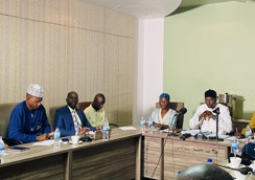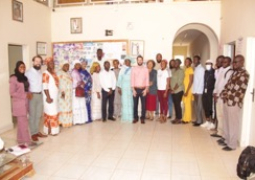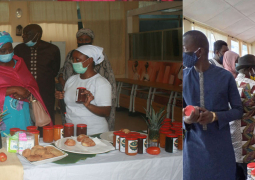
In line with this, Governor Lamin CD Bah noted that the government of The Gambia has partnered with development partners such as Global Environment Facility (GEF) and United Nations Environment Program (UNEP) in the implementation of Various Multilateral Environment Agreements (MEAs) such as those dealing with the sustainable and sound management of chemicals and waste.
Governor Bah made these revelations during the official opening ceremony of a two day training and sensitisation of Security officers in official border posts in LRR, NBR, CRR and URR as well as settlements believed to be transportation routes for illegal movement of chemicals and waste. This conclave hosted at the conference hall in the Governor`s office in Mansakonko, was organised by the National Environment Agency in collaboration with the Joint Operation Center (JOC).
The objective of the training is to strengthen the technical capacity of security officers at various border posts and settlements within major trade routes, intending to improve their participation in the control of illegal traffic of chemicals and waste in the country.
The National Environment Agency is currently implementing a project “Institutional Capacity Building for the Implementation of the Multilateral Environment Agreements (MEAs) funded by the United Nations Environment Program through the Special Program Trust Fund. As part of activities for the project, the agency is organising two days…………….
According to NEA`s Executive Director Dawda Badgie, chemicals are important determinants for sustainable development, sound environmental health and quality of life. While the use of chemicals in all human activities (e.g. agriculture, health, energy production, manufacture, services and residential) contributes to improving the quality of life, it also raises concerns about its harmful effects on workers, consumers, the environment and society at large through exposure. Furthermore, accidental releases from the distribution, consumption and disposal of chemicals may permanently damage soil, water and air.
“The Gambia Government in partnership with UNEP Special Program Secretariat is implementing this important project as part of the implementation of the Stockholm Convention on Persistent Organic Pollutants (POPs), The Basel Convention on control of trans-boundary movement of hazardous wastes and their disposal, The Rotterdam Convention on the Prior Informed Consent Procedure, The Minamata Convention on Mercury and Strategic Approach to International Chemicals Management (SAICM)”. Dr. Badjie pointed out.
Furthermore, he added that The Gambia has ratified all the aforementioned conventions with the ultimate aim to protect human health and the environment. The Gambia, he said has recognized the need toward the development of an institutional framework for the sound management of chemicals and waste to enhance implementation at national level, hence the implementation of the project.
As part of activities, the NEA boss revealed that the project is to train cross border officers on sound management of chemicals and waste. It has been observed that most chemicals coming into the country pass through our porous borders and there is not much control of illegal trafficking of these chemicals and other hazardous waste. To fight this situation, Director Badjie mentioned that there is a need to train security officers at various border points on the legal requirements on the importation and export of chemicals and waste in the country. This is in recognition of their importance in the fight against chemicals, that was why the training is being organised.
The objective of the training, Badjie said is to strengthen the technical capacity of security officers at various border posts and settlements within major trade routes to improve their participation in the control of illegal traffic of chemicals and waste into the country.
Read Other Articles In National News

The Namie Foundation pays courtesy call on Gambia’s Vice President
Aug 7, 2023, 12:33 PM

Defence Committee meets relevant stakeholders to address road accidents
May 6, 2024, 11:31 AM



